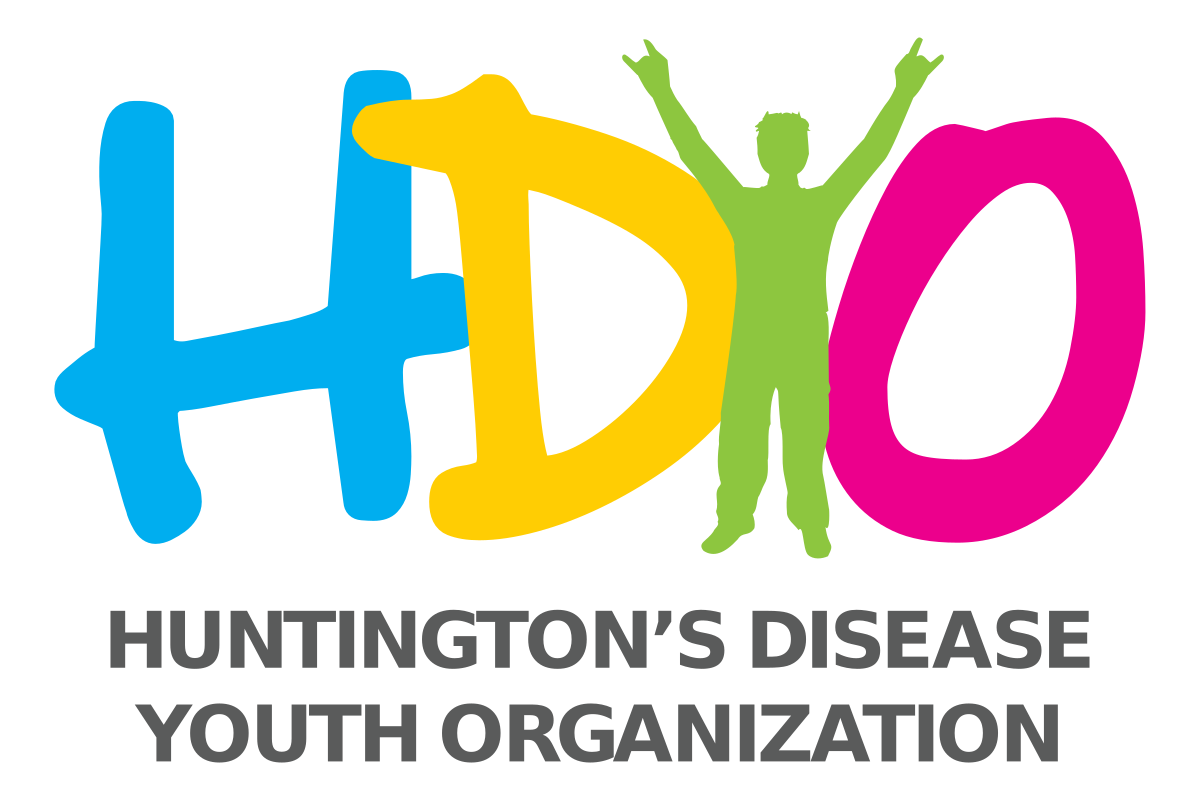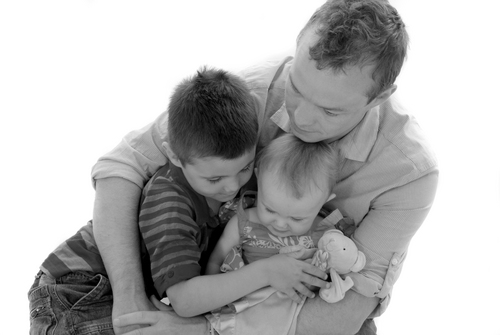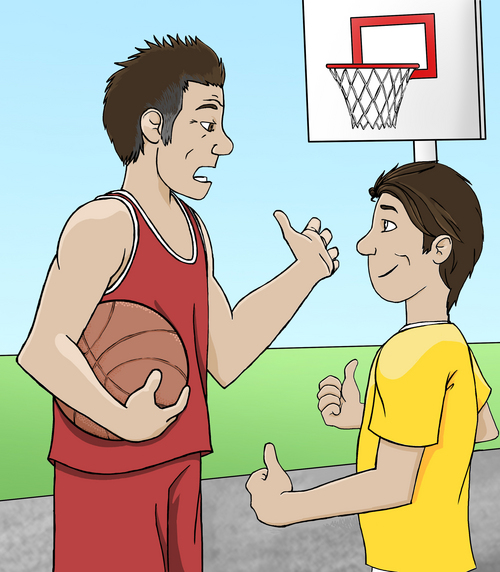Talking to Kids About HD
November 23, 2021

HDYO has more information about HD available for young people, parents and professionals on our site:
www.hdyo.org
Information and techniques used to talk with children about Huntington's disease. Including advice from licensed social workers with a background in Huntington's, along with testimonials from children and parents.
HDYO believes in the importance of talking to children, about Huntington's disease, in a safe and appropriate manner. We have put together this section by ways of talking to many young people, their parents and a special thankful help to Dr Bonnie Hennig-Trestman for the material from her book Talking to Kids About Huntington's Disease.
Reasons for talking to kids about Huntington's
Families affected by Huntington's have additional stressors when children are involved. Parents and caregivers may feel the best way of protecting children is to shield them from the knowledge that Huntington's is in the family. While this coping style may appear to benefit the family in the beginning, it is unfortunately detrimental to the child in the long run.

Many adults state that Huntington's was hidden from them and not discussed in their homes. Their reaction to this is anger. This anger can make coping with Huntington's that much more difficult. These adults may feel a lack of trust in the family. They might feel that the choices they have made about their lives (even if these choices would have been exactly the same), were made without having all the information available.
If the topic of Huntington's is not discussed, children may still pick up that there is something wrong. They may even have fears worse than the real situation. For example, they may imagine that they did something to cause a family member to become ill. In turn, the child might develop anxiety and guilt. Not talking about Huntington's can give the message that it is a subject too terrible to discuss.
'Huntington's disease in my family was a secret. The illness was never spoke of or explained which made me feel like it was a shameful thing. I understand that my parents didn't want to face up to things or scare us, but leaving us to work out genetics and finding out aged 13, and my sister 14, by ourselves, caused destruction and devastation beyond belief.' Shane
If Huntington's is not discussed within the immediate family it is almost certain to come up somewhere else. Huntington's and other genetic illnesses are continually highlighted in the media and there are many sites on the internet that provide information about Huntington's. Genetics is also a topic that comes up more and more on the school curriculum.
Remember, children have an amazing ability to deal with difficult situations. Fears are learned. If something is hidden from a child, the message they get is that this is scary. If a child is told what is happening, it becomes part of their normal routine and there is no need to be afraid of it. Children who know about Huntington's have an explanation as to why mum or dad sometimes acts 'strangely'. Instead of pulling away from the person with Huntington's because they are afraid of them, children will continue to show affection and respect towards that person.
'My daughter was only 4 years old when she would look at her daddy strangely. I wondered what she was thinking and I could tell she knew her daddy was 'different' to others. She would sometimes ask what was wrong with daddy and I would brush it off. Too young I thought. One day I decided to sit her down and told her daddy was poorly with Huntington's disease, that's why he did odd things. It seemed to work and the questions stopped and the next few years she would proudly hold his hand whoever was looking at us. I did not go into her risk or complicated genetics at this point, but it gave her a name and an introduction to the illness.' Trisha
Who should tell the kids
If you can, you (as the parent) should tell the children. We understand however that whether you have the gene for Huntington's yourself or you are the caregiver, sometimes and for whatever reason, this is impossible or too difficult at the present time. If that is the case, then the next option would be a close family member or friend. The important thing is to make sure the child feels comfortable with this person and that this person is knowledgeable and has correct information about Huntington's disease.

If neither of these options works for you, then you may decide to have a professional healthcare provider help you talk to the child. Again, please make sure that this person is someone who works with people who have Huntington's. It is also important to give the child some type of information about why they will be meeting with this person. If the child did not expect to get this information, it would be very scary for them to meet a new person in a strange new place and have that person tell the child someone in their family is ill.
You may first want to tell the child, the doctors have found out why mum has been ill or is acting differently. Then you can tell them, "This is because mum has an illness called Huntington's disease. The doctors, nurses and social workers are going to meet with you to give you some information about Huntington's". Some family members have brought children into the clinic with them for the first time just to see where it is they go when their loved one goes to the clinic. This makes the environment familiar to the child. At the next appointment the child will be invited into the meeting to meet the staff member.
When should I tell the kids
Children can be told at any and all ages. Obviously the younger the child is, the more basic the information will be. The earlier you talk about Huntington's however, the more normal it will become for the child.
How should I tell the kids
The way you feel about discussing Huntington's with your children will be based on your own experiences of how you were told about Huntington's disease. Look at your own experience. Was Huntington's talked about in an open and honest way? Was Huntington's hidden and never allowed to be discussed? Think about how you feel about your experience. Do you feel confident that you can pass on your experience or do you feel angry and resentful? If you are feeling angry, talk to a professional about this and try to work out these feelings before you speak to your children. No matter how hard you try to hide them, these feelings will come out in your discussion. Try to move toward resolving them and then you will feel better about talking to your children.

Remember that you will need to talk to different age children separately. A good idea however, is to begin the conversation with everyone present. In this way, you will be giving the message that no one in the family is being left out. Provide basic information, like the name of the disease to everyone first. Later you can talk to each age group in more detail.
You also want to find a comfortable place to talk to your kids. You might be a family who lines everyone up on the couch to relay news to them. If this is not the case, then don't start now. Perhaps you normally talk to one another over dinner or during a walk. Maybe you have your best talks cleaning up or while playing a game. You don't have to make the talk into a big occasion, it is more important the children are comfortable with the discussion and their surroundings.
What should I tell the kids
It is important to know that truly the experience of talking to children about Huntington's is less distressing than the anticipation leading up to the talk. All the things you are thinking about and the fear in having this discussion usually go away once you begin to talk to your kids about Huntington's. Realise however, this is not a one time discussion. This topic will need to be revisited from time to time to make sure everyone has the most up-to-date information and a chance to ask questions.
It can be better to label Huntington's right away so that the child knows this is different. You might want to say, "Daddy has an illness. It is called Huntington's disease". Perhaps you want to add, "This illness makes daddy do strange things sometimes". It can be helpful to list those things with the child. Many times a parent is surprised to hear how many things the child notices are different between the person with Huntington's and other people in the family who are not affected. By allowing the child to take control of the conversation, parents can learn what the child is observing.
Gradually share bits of information with children. Think about how you feed a baby. You use a small spoon and give them a tiny bit of food first. Then you wait to see how the baby reacts and whether they can swallow the food. The same is true when you talk to children about Huntington's. Give them a small bit at a time and see whether they can take it in.
Tell children they will always be loved and cared for. Besides having children worry about you and other family members, a child is worried about what will happen to them if you are not available. Assure them their needs will be met. There is hope now more than ever that we are getting closer to a cure. Let children know that scientists are searching for a cure for Huntington's every day.
If a child asks a question, listen to what the real meaning is behind the question. Answer their questions simply. A child may ask, "How do you know you will get Huntington's?" Instead of talking in detail about the science of CAG repeats, it is better to simply say that the doctors did a blood test and that test showed you have the gene for Huntington's.
It is very helpful to also ask children what they think Huntington's is once you have explained it to them. Many times there can be misperceptions or things that aren't true. Many adults also say, "Oh my kids know what Huntington's is, they saw their parent with it". Even though this is true, it can be very interesting to hear what the child's answers are to this question. One way of doing this is to say to the child, "I need to make sure I did a good job of telling you what Huntington's is. Can you tell me what I said to you?"
When you do hear what their interpretation of Huntington's is, it gives you a chance to correct any wrong information. You can do this by saying something like, "Well you are right, daddy did this, but not everyone with Huntington's is like that" or "Yes, Huntington's was in daddy's family but it doesn't come from someone doing something wrong, it is an illness".
You may also want to ask kids directly if they are worried about you or the affected family member. Children don't usually want their parents to think they are concerned about them. They think this will over burden their parents or make their parents feel sad that the child is afraid about what will happen. If the child says, "No, I'm not worried", you can say something like, "Well I want you to know, when I heard about Huntington's I really worried. I found out that it is normal to feel that way. While we can't make the Huntington's go away, we can support each other if we are scared. So if you ever feel this way, I want you to know you can come and talk to me".
Whatever you do, don't lie. Lying takes a lot of energy. You need to keep track of what you said to whom, screen phone calls and mail as well as keep people from talking to each other. It can be very difficult. When you are honest, you don't need to burden yourself with all the added stress of trying to keep track of all this.
Don't make promises you can't keep. Telling a child that you promise they will not have Huntington's or promising that you will always be able to take care of the affected parent can be misleading. Unfortunately, unless circumstances were such that testing was already done, no one has control to say if a child has inherited Huntington's. If the child does grow up to later find out they carry the Huntington's gene, a bond of trust will be broken. In the same way, if you promise that you will take care of the person with Huntington's, you set yourself up for resentment.
It is much better to say that you will do everything you can to make sure the parent with Huntington's gets the proper care they need. Let the child know that this care may be in the home or out, but that you will inform them of everything that is going on before anything happens. This way the child knows they will be included in the caretaking process and that many options may be available in the future.
Finally, don't push kids to talk. There are some children who will never open up. The goal is to provide a safe place for kids to come back and talk when they have questions.
Other things to keep in mind
Changes
It is important to let children know gradually there will be changes in what the person with Huntington's is able to do. Again, try to stay one or two steps ahead of the child. It is not helpful to let a child, whose parent is a Huntington's gene carrier but is not symptomatic, know this person will not be able to drive. That may not happen for years. It is also not helpful for a child to wake up one morning to find that daddy doesn't go to work anymore. As you are starting to plan for these things, let the child know that these changes may start.
There are many unknowns and uncertainties in dealing with Huntington's. Some children might be relieved to hear the facts about Huntington's. They may see multiple people in the family acting strangely and feel this will inevitably happen to them. The facts about Huntington's may be more hopeful than their fears.
If you find out as much information about Huntington's as possible, you will be able to make the unknown more familiar. If you educate yourself, then you can begin to educate your family. Educating young people about Huntington's is so important. With knowledge comes the power to cope and overcome any fears they might have about the future.
Laughter

Take time to share special moments together as a family. Besides creating positive memories you will also be giving a gift to your children. You will be teaching them that even in the midst of sadness, it is okay to have fun. Many caregivers say that it is very difficult for them to go out and have a good time. But it is very important to have fun and it is a great way to take care of yourself, you can then take care of others without feeling so burnt-out.
There is the saying, "Laughter is the best medicine". Take time out with the family to share laughter and create good memories.
Finally, the silver lining...
There is a small silver lining to living in a family that has Huntington's disease. Children who are aware that Huntington's is a normal part of their lives may become more self confident and independent. They may learn to become more responsible, mature, and sensitive to others needs.
In short young people living in a family that has Huntington's disease may end up becoming very strong young individuals, with a firm sense of what is important in life.
All the above material was taken from Talking to Kids About Huntington's disease; 2017 (C) Dr Bonnie Hennig-Trestman. You can find out more about Dr Bonnie and information about ordering her book on the Talking to Kids About Huntington's Disease Amazon Kindle page.



